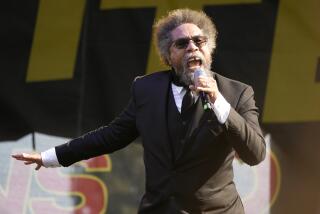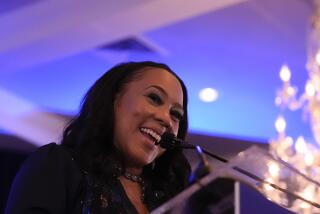Fired prosecutor’s testimony raises broader concerns
WASHINGTON — It was just three weeks before election day 2006, and Rep. Heather A. Wilson was on the ropes. Opinion polls showed the New Mexico Republican trailing her Democratic opponent in a tough campaign.
Even with the support of Wilson’s influential mentor, Sen. Pete V. Domenici (R-N.M.), many Republicans feared she would lose her seat and cost the party control of the House.
One person in a good position to help Wilson was U.S. Atty. David C. Iglesias, who was investigating Democratic corruption in her home state. A late-breaking indictment of Democratic officials could help Wilson distance herself from sex and lobbying scandals plaguing the GOP in Washington.
That’s why eyebrows raised when it was recently disclosed that, in the heat of her fight for political survival, Wilson called Iglesias to ask about possible indictments. So did Domenici.
Both lawmakers have denied that they called Iglesias for political purposes or pressured him. But questions about their actions have turned what might have been a narrow investigation of the Justice Department’s late-2006 decision to fire Iglesias and seven other U.S. attorneys into a broader controversy about the ethical limits of lawmakers’ influence on prosecutors.
Those broader questions may be addressed if the matter is brought under formal investigation. The FBI has not opened an inquiry, but the Senate Ethics Committee has announced a preliminary investigation. Congressional sources say that fellow lawmakers may file a complaint with the House Ethics Committee. And one government watchdog group -- Citizens for Responsibility and Ethics in Washington -- has filed complaints with both ethics panels.
Democrats see the New Mexico episode as indicative of the lengths Republicans were willing to go to gain political advantage in the crucial midterm elections that ended up changing the balance of power in Congress.
Wilson’s Democratic opponent in November, Patricia Madrid, accused Wilson and Domenici of crossing an ethical line with hardball tactics encouraged by Karl Rove, President Bush’s political advisor. Rove attended a fundraiser for Wilson during the campaign and kept close tabs on the race.
“I think it was very contrived and manipulated, and they absolutely used the justice system to benefit Heather Wilson,” said Madrid, who was in Washington this week as hearings were held on the firings.
In the end, ethics charges and countercharges probably had less effect on the outcome of the race than both sides expected. Wilson ultimately came from behind to win by 875 votes. The crucial factor, most analysts say, was Madrid’s poor performance in their only televised debate.
Wilson’s race was closely watched by national political leaders from the outset because she represents a classic swing district: a Democratic-leaning area of New Mexico that repeatedly reelected the moderate Republican.
She won her seat in the House after Domenici threw his considerable political weight behind her as she ran against a crowded field of candidates in a 1998 special election. Democrats tried repeatedly to unseat her, but got their best shot in 2006 when they persuaded Madrid, the popular state attorney general, to run against her.
Madrid and national party officials linked Wilson to two things deeply unpopular among her constituents: Bush and the war in Iraq. They also tried to tie her to GOP ethics scandals involving discredited lobbyist Jack Abramoff, and ran an early television ad criticizing her for accepting campaign donations from former Rep. Tom DeLay (R-Texas).
Republicans used the ethics issue to fire back at Madrid. Wilson accused Madrid of dragging her feet in state corruption investigations. And national GOP officials compiled two volumes of research to raise questions about Madrid’s ethics. “That was a big part” of the national strategy to stymie Madrid, one GOP operative recalled.
But the political climate was moving against Wilson. Democrats at the top of the ticket -- Sen. Jeff Bingaman and Gov. Bill Richardson -- were leading by double digits. In Washington, word broke that then-Rep. Mark Foley (R-Fla.) had sent sexually explicit e-mails to teenage boys who had served as congressional pages; Wilson was on the board overseeing the page program and had to explain why she did not know of his misconduct. Bush’s approval rating in New Mexico was among the lowest in the country, and the war in Iraq went from bad to worse.
An independent poll in late September had the race tied at 44% to 44%, and by mid-October surveys showed Wilson trailing by as much as 8 percentage points.
The Republicans saw an opportunity in ethics scandals that were roiling state government, including Iglesias’ prosecution of two Democrats -- a state treasurer and former state treasurer -- just a few weeks before the election. Against that backdrop, Iglesias feared that Wilson and Domenici were trying to draw him into the election fray, with plans to use him and his office in political attack ads against Madrid, he said in testimony this week before the Senate Judiciary Committee.
Iglesias said that he considered Domenici his mentor because he had helped get him appointed as U.S. attorney in 2002. And he considered Wilson, whom he had campaigned with in 1998, “a friend, an ally.”
But after his prosecution of the state treasurers, Iglesias said he believed it was clear that Wilson and Domenici wanted more indictments, this time in an ongoing public corruption investigation involving the construction of a new courthouse in Albuquerque. Several Democrats were viewed as potential targets, and Iglesias understood that news of indictments against them would probably boost Wilson’s chances.
“I was aware that public corruption was a huge battle being waged by Patricia Madrid and Heather Wilson in the 1st District,” he said. “And I assiduously tried to stay out of that fight.”
Wilson called Iglesias on Oct. 16, while he was staying at a hotel in Washington. He said she asked him whether there were sealed indictments in the courthouse corruption case.
Wilson says she merely called to pass on a constituent complaint that Iglesias was “intentionally delaying corruption prosecutions,” and said that “this allegation was deeply troubling” to her. She added, “My call was not about any particular case or person, nor was it motivated by politics or partisanship. I did not ask about the timing of indictments, and I did not tell Mr. Iglesias what course of action I thought he should take or pressure him in any way.”
In the final weeks before the election, both parties poured enormous resources -- and star power -- into the race. In the home stretch, Laura Bush campaigned for Wilson; former President Clinton stumped for Madrid.
For Domenici, the stakes in Wilson’s race were personal and political. He has been her most important patron, and many believe that Domenici is grooming her to replace him in the Senate after he retires. He had played a big role in her campaign, making appearances and endorsing her in radio and television ads.
Domenici denies he was seeking political advantage for Wilson by calling Iglesias days before the election. Iglesias said Domenici called him at home and expressed disgust that there would be no indictments before the election, then hung up.
Although Iglesias said he “felt leaned on,” Domenici said he was just inquiring about the courthouse corruption case because of media reports that “the FBI had completed its work months earlier” and still there were no indictments. “In retrospect, I regret making that call, and I apologize,” Domenici said.
The resulting controversy has been an embarrassment to Domenici, who at 74 is a senior member of the Senate respected for his mastery of budget and energy policy, and for Wilson, who has carefully cultivated a straight-arrow image. With her close-cropped hair and ramrod posture, she frequently invokes the Air Force Academy’s code of honor: “We will not lie, steal or cheat, nor tolerate among us anyone who does.”
Some see Iglesias’ public statements about the phone calls as disloyal.
Paul Kennedy, a Republican and criminal defense lawyer in Albuquerque, said that many in New Mexico were “totally mystified why Iglesias would turn on Domenici and Wilson.”
“They are two of the most upstanding people in the state, and they sponsored him and really tried to help him out in his office and get him more resources.”
But when Iglesias got fired, Kennedy said, “instead of taking it like a man, all he does is whine about it.”
*
richard.serrano@latimes.com
mark.barabak@latimes.com
Barabak reported from San Francisco. Times staff writers Richard Simon and Tom Hamburger contributed to this report.
More to Read
Sign up for Essential California
The most important California stories and recommendations in your inbox every morning.
You may occasionally receive promotional content from the Los Angeles Times.













